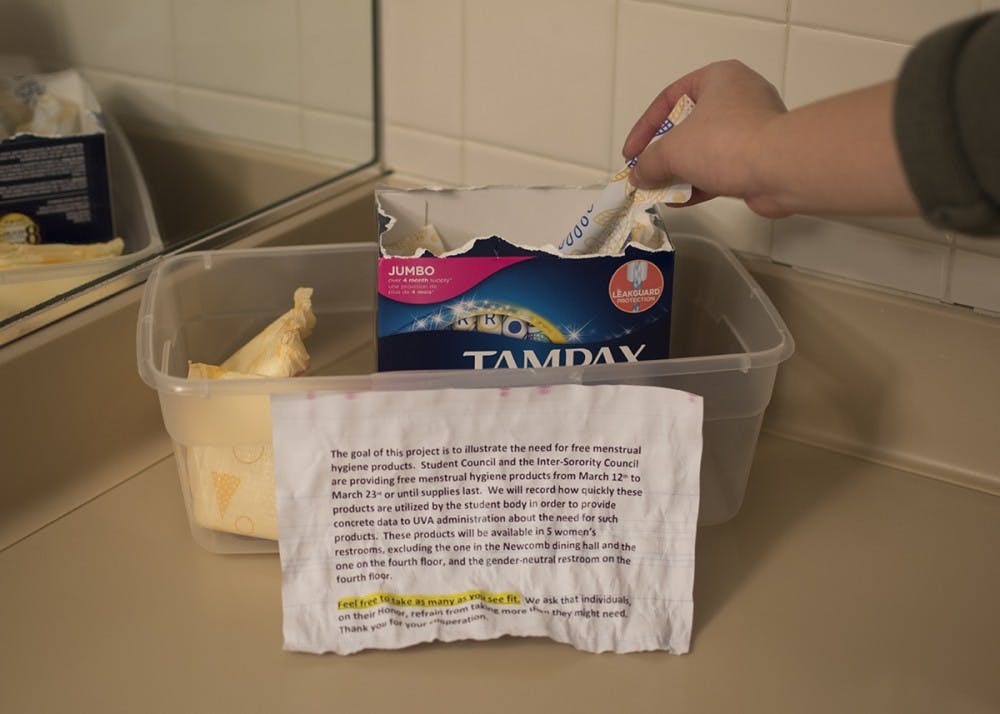In an effort to empower women, foster gender equality and join a national movement, the University’s Student Council and Inter-Sorority Council provided free menstrual hygiene products in five Newcomb Hall bathrooms from March 12 to March 23. The event coordinators hoped to inspire the University administration to make their unprecedented, short-term project into the norm for public women’s restrooms on Grounds.
The event was first developed within Student Council’s Safety and Wellness Committee at the start of the spring 2018 semester. Alex Cintron, a third-year College student and 2018 Student Council President-elect, helped to draw attention to the event’s significance during his campaign.
Once Zoe Denenberg, third-year College student and president of the ISC, heard about Student Council’s plans, she asked to join forces by providing monetary and advertising support. She said this event could impact all 2,600 female members of the ISC.
“First and foremost, I hope that this event eases the stress and financial burden of finding menstrual hygiene products,” Denenberg said. “Secondly, I hope this event shows the U.Va. community and the administration the importance of supplying basic necessities for free on Grounds.”
A Facebook event, “Free Menstrual Hygiene Products,” advertises and discusses the importance of the “access to basic necessities on Grounds.” However, in interviews with The Cavalier Daily, some students stated that they were not aware of the event.
Members of the University’s student body is not the first to suggest free female hygiene. For over 10 years, the University of Minnesota supplied free tampons in each public building on their campus. In 2016, Brown University sparked a national conversation when students and their Student Council convinced their undergraduate student finance board to provide free tampons in all bathrooms, men and women’s, in order to be gender inclusive.
Since then, over 40 universities have attempted similar policies. Some universities have succeeded with their programs, while others, like Columbia University, have found mixed results and interest within their student body, possibly because of the program’s lack of accessibility and advertising.
Student Council and ISC used a $400 budget to distribute over 900 pads and 750 tampons within five of the women’s restrooms in Newcomb. Neither of the student-run committees had the funding to sustain the event for more than two weeks. Thus, this event served as a short-term research effort to demonstrate a need within the student body to the University administration.
“I think it’s a long time coming honestly,” second-year College student Caetlin McFadden said. “The same way you can get free condoms just about anywhere on Grounds, a girl should be able to get a free tampon.”
Free condoms are provided by the University’s Elson Student Health Center — they can be obtained at the center and also from resident advisors in on-Grounds housing. McFadden said the free condoms set an example for how the University should treat female hygiene products.
Shiann Gardner, a fourth-year College student, said this program would be particularly helpful on the days when she forgot to pack extra tampons with her. Megan Leimkuhler, a second-year College student, said she believes the University would be able to provide significant financial aid and send a powerful message if they followed Student Council’s lead.
“Tampons are expensive,” Leimkuhler said. “This is just a step in the direction of female empowerment. Treating us like equals who have actual bodily needs.”
Prior to the start of the event, Denenberg and Overton said they would measure its success based on how many products were taken each day, and they would consider it a great success if supplies ran out before March 23.
“With that being said, even if this event only helps one individual by providing menstrual hygiene products, we view that as a success,” Overton said.
After the event finished, University administration and Student Council were asked about the results and their opinions of data and the event, but both have yet to comment. However, Alexandra Dimas, a second-year College student, said she appreciated the event because, during those two weeks, she did not have to worry about carrying extra hygiene products with her in case of emergencies.
“This time, no awkward exchanges, no having to ask a stranger,” Dimas said. “For the first time, I was able to make a common issue and hassle into an easy situation.”
Currently, there are not any definitive plans for the future of this event. However, the incoming Safety and Wellness Chair and Committee can vote if it would like to continue or advance this initiative.







